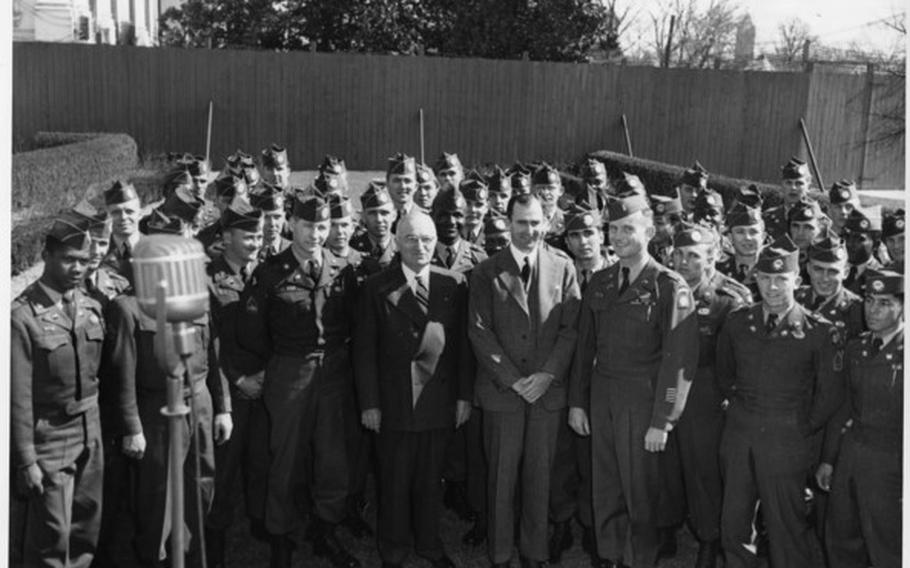
President Harry S. Truman (front row, fifth from right) and Secretary of the Army Frank Pace (front row, fourth from right) with members of the integrated 82nd Airborne in the Rose Garden behind the White House in February, 1951. (Truman Presidential Library, 63-1162-05/Library of Congress)
This summer marks the 75th anniversary of a monumental moment in our nation’s history — the signing of Executive Order 9981, which desegregated the U.S. armed forces. The president who signed that order on July 26, 1948, is a man I knew well: my grandfather, Harry S. Truman.
To commemorate this pivotal decision that advanced civil rights in America and honor the service and sacrifice of Black veterans, the Truman Library Institute will host the Truman Civil Rights Symposium on July 26-28 in Washington, D.C. The timing is appropriate, and not simply because it’s the 75th anniversary. The fight for equality is far from over. It continues, unabated, in communities, statehouses and military installations across the country.
At the close of World War II, Black soldiers came home to a hostile, deeply segregated nation. They were often shunned, insulted — even brutalized and killed — in an attempt to reimpose the prewar racial status quo. My grandfather, a veteran of the Great War, was outraged by the violence against returning veterans, particularly the violence endured by U.S. Army Sgt. Isaac Woodard.
After serving with honor in the Pacific, Woodard was on his way home when he was removed from a Greyhound bus in Batesburg, S.C. At a rest stop, he asked the driver if there was time to use the restroom. The driver not only refused, but cursed Woodard, at which point the sergeant said, “Talk to me like I’m talking to you. I’m a man just like you.” At the next stop, the driver called Police Chief Lynwood Shull, who, with a couple of deputies, dragged Woodard, still in his military uniform, off the bus and beat him so severely he was blinded for life. Though my grandfather pushed for the offenders’ arrest and trial, an all-white jury acquitted them.
In response to brutality and hate, my grandfather put aside political concerns and did what was right. The blinding of Sgt. Woodard was a turning point in his life and leadership that ultimately led to one of the most important and politically courageous acts of his presidency.
He formed the first-ever President’s Committee on Civil Rights that issued its 1947 landmark report, To Secure These Rights, calling for equal voting rights, equal employment, fair-housing laws, and the creation of a Civil Rights Division of the Justice Department to combat lynching and other assaults on Black lives and freedoms. On June 29, 1947, he became the first president to speak to a civil rights organization, addressing the NAACP on the steps of the Lincoln Memorial.
Ultimately, he did what Congress would not. On July 26, 1948, he signed Executive Order 9981, desegregating the U.S. armed forces. It established that “There shall be equality of treatment and opportunity for all persons in the armed services without regard to race, color, religion or national origin.” It signaled that Americans could no longer reconcile racial inequity with the values that our nation’s soldiers and sailors had fought, bled and died to uphold. That same day, he signed Executive Order 9980, which banned racial discrimination in federal hiring. Both paved the way for civil rights legislation and Supreme Court decisions in the 1950s and 1960s, including Brown v. Board of Education, integrating public schools.
Without Executive Order 9981, our nation would not have had leaders like Army Gen. Colin Powell, who became the first Black chairman of the Joint Chiefs of Staff and the first Black U.S. secretary of state. We would not have Lloyd Austin, a retired U.S. Army four-star general, as our secretary of defense — the first Black American to serve in this role. We would not have Michelle Howard, a retired Navy admiral who became the first Black woman to reach three and four stars in the armed forces and the first Black woman to command a Navy ship. And we would not have Gen. Charles Q. Brown serving as the chief of the Air Force and recently nominated as the next chairman of the Joint Chiefs of Staff.
I’ve often said that my grandfather’s greatest accomplishment was showing the country and the world that an ordinary, middle class American from the Midwest, a farmer, a small-businessman and a citizen soldier, can rise to the highest office in the land and do a better job of it than almost anyone else.
That is the promise of America — and it must be extended to all Americans. The objectives he pursued through his civil rights decisions remain as relevant and important now as they were in 1948 — and we still have much work to do. As my grandfather said, “Whether discrimination is based on race, or creed, or color, or land of origin, it is utterly contrary to American ideals of democracy.”
Clifton Truman Daniel is the eldest grandson of President Harry S. Truman and first lady Bess Wallace Truman and honorary board chair of the Truman Library Institute.